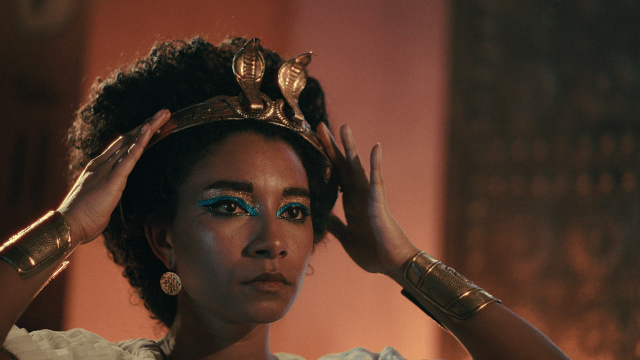Egyptian Queen Cleopatra has captivated the attention of historians for centuries, many of whom say she was descended from Macedonian Greek kings, and claim that very little of her background was steeped in non-Greek ancestry. The new Netflix docuseries, African Queens, is changing the narrative and has received some backlash for casting a biracial actress as Queen Cleopatra.
Adele James, known for her role as Tina Mollett in the TV series, Casualty, was selected to take on the portrayal of Cleopatra, highlighting the centuries-long dispute over the Egyptian ruler’s cultural identity. At the time of Cleopatra’s reign, Egypt was a multicultural and multiracial country, including Greeks, Jews, and ethnic Egyptians.
Although Cleopatra’s ancestry is traced back through the Macedonian dynasty, there is very little known about the identities of her mother and paternal grandparents, leading some to believe she was partly indigenous Egyptian.
The show’s director, Jada Pinkett Smith, told Tudum it was important to tell Cleopatra’s story, saying, “We don’t often get to see or hear stories about Black queens, and that was really important for me, as well as for my daughter, and just for my community to be able to know those stories because there are tons of them.” She added, “The sad part is that we don’t have ready access to these historical women who were so powerful and were the backbones of African nations.”
Netflix declined Gizmodo’s request for comment.
Some Egyptian historians now claim that Netflix is falsifying the country’s history. Mostafa Waziri, Egypt’s secretary general of the Supreme Council of Antiquities said in a statement that Cleopatra is racially misrepresented in the Netflix show.
“The actress appearing in that manner is a falsification of Egyptian history and a blatant historical inaccuracy,” Waziri said, adding, “especially that the film is classified as a documentary rather than a drama series, which should have made it necessary for those producing the series to exercise caution and refer to historic and scientific facts that would include not falsifying the history and culture of other people.”
Cleopatra’s story dates back to 69 BC, before accurate depictions of race and cultural ethnicity, yet some researchers are relying heavily on busts and drawings of Cleopatra as a reference point. Egyptian archaeologist and antiquities minister, Zahi Hawass, told NBC News that historical artifacts prove that Cleopatra was not Black. “If we see statues and forms of her father and brother, we will not find any evidence supporting this claim that she was black,” he claimed. Meanwhile, Egypt’s Supreme Council of Antiquities said in a Twitter post that “Statues of Queen Cleopatra confirm that she had Hellenistic (Greek) features, distinguished by light skin, a drawn-out nose, and thin lips.”
Waziri claimed complaints surrounding the Netflix series are not racially driven, but rather are an attempt to preserve Cleopatra’s history, adding that he has “full respect for African cultures and to our brothers and sisters from the African continent.”
Producers told Tudum the casting choice was deliberate and while the aim of the show “has always been to uncover the hidden histories of powerful women from the past and what made them leaders that we still talk about today … we did intentionally decide to depict her of mixed ethnicity to reflect theories about Cleopatra’s possible Egyptian ancestry and the multicultural nature of ancient Egypt.”
The show’s director, Tina Gharavi, defended the casting choice in a Variety op-ed article last month, questioning, “Why do some people need Cleopatra to be white?” She continued, “Perhaps it’s not just that I’ve directed a series that portrays Cleopatra as Black, but that I have asked Egyptians to see themselves as Africans, and they are furious at me for that.”
